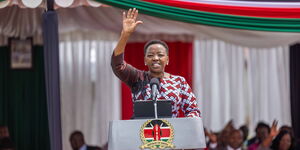Energy Cabinet Secretary Opiyo Wandayi has unveiled key proposals aimed at reducing the cost of electricity and expanding access to millions of households across the country.
In the recently published Draft National Energy Policy, Wandayi announced that the government will review electricity tariffs every three years to ensure predictability, timely cost recovery, and fair, cost-reflective pricing for consumers.
Additionally, the policy proposes the establishment of a Competitive Electricity Retail Market with private sector participation. This initiative will facilitate the creation of downstream Electricity Supply Companies (ESCOs), allowing private sector players to actively participate in electricity distribution and retail.
To further enhance competition and affordability, the policy encourages structuring Power Purchase Agreements (PPAs) that enable generators to sell electricity directly to consumers, therefore ending the monopoly enjoyed by the government in the supply of electricity, which Kenyans have in the past attributed to the high cost of power products.
These flexible power purchase contracts will support direct retail and power wheeling, ensuring more competitive pricing and increased efficiency in the electricity sector.
To ensure that a good number of low-income Kenyans get access to power, the CS revealed that the government will provide targeted fiscal incentives, such as tax exemptions, subsidies, and grants, to support low-income households to ensure they have equitable access to energy.
Furthermore, the government will provide adequate fiscal incentives and harmonize various charges levied on energy operations to create an attractive and predictable investment environment in the energy sector.
This will reduce the cost of power and energy-related products, as the government hopes the interventions will trickle down to the consumers of the same.
To enable the government to achieve all these, Wandayi revealed that the government will explore financing options from both local and international sources to help fund the ideas.
Additionally, the government will continue searching for public-private partnership (PPP) investors in the sector to help the government mobilize funds for the financing of the development infrastructure. This will also include asset monetization, climate financing, and local equity funds.
The search for investors in the PPPs financing model comes at a time when the government recently suffered a setback in the last quarter of 2024 when President William Ruto was forced to cancel all the contractual arrangements that Kenya had with the Indian conglomerate of companies, Adani Group.
This was after the decision sparked a wave of condemnation from the public over the circumstances surrounding the investments.












